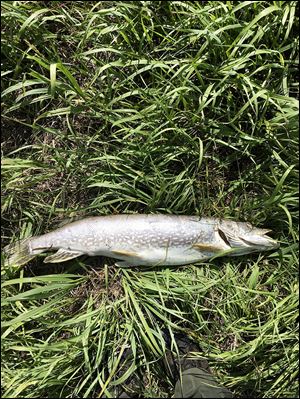
EDITORIALS
State, federal government need to do more to protect our waterways
8/29/2017
A fish kill in Williams County on Aug. 17 highlights in stark terms the failure of Ohio in dealing with animal waste and fertilizer runoff into the state’s waterways.
On the same day as about 15,000 fish suffocated when ammonia from manure flowed into Beaver Creek in eastern Williams County, Mike Ferner of Advocates for a Clean Lake Erie, Frank Szollosi of the National Wildlife Federation, and Sandy Bihn of the Lake Erie Foundation warned The Blade’s editorial board about the dangers of agricultural runoff.
RELATED CONTENT: Authorities investigate death of thousands of fish in Williams County ■ Poor manure practices culprit in fish deaths ■ More Blade editorials

The deaths of thousands of fish last week in Williams County underscored the state's failure to deal with animal waste and fertilizer runoff.
All three agreed that the powerful Ohio Farm Bureau has long had the ear of members of the General Assembly. The Bureau has rightfully fought for property-tax relief for its members. But it has also lobbied against an impairment designation for the western basin of Lake Erie and against stricter rules for fertilizer application. The most glaring and inexcusable protection for farmers is the anonymity they are afforded when their manure is spread on farm fields and it leaches into nearby waterways.
The argument from agricultural industry leaders is that the farmers using the manure will be subject to harassment. But that’s absurd. No one wants to harass Ohio farmers, who feed Ohio and much of the rest of the world.
But there must be an accounting for the dead fish in Williams County and in Allen and Hardin counties, where two other manure spills killed more than 51,000 fish earlier this month.
If anyone knowingly endangers the health of the environment, he should not be allowed to hide behind the cloak of anonymity. Authorities have a good idea where much of the manure came from in the three spills, but they won’t be certain unless DNA testing is done. A fish kill should not turn into an episode of CSI.
In Mercer County, residents are understandably concerned by plans for a 4,500-head dairy proposed northwest of Neptune, Ohio, that would produce the same amount of waste as 75,000 people. There is no way that a city of this size could get away with no sewage treatment, or closing its sewage treatment plant. There is no way that much human waste could be dumped legally into waterways.
This is the linchpin to the argument for more stringent regulation: Waste, whether animal or human, must be treated and cannot be poured into our rivers and lakes.
Ohio should welcome all types of farms and farming, including agribusiness. But every business, like every citizen, has an obligation to be socially responsible — to clean up after itself.
An impaired designation for Lake Erie, under the federal Clean Water Act, continues to be a needed step. It would set limits on the amount of discharges — fewer cattle on more acres — and it would result in more scrutiny of the source of the discharges. But even an impairment designation would not require the state to compel megafarms to treat their waste. When the water supply of the general public is at stake, that is not too much to ask.